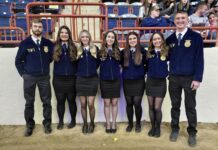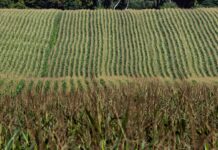A few weeks ago, I came back to the office late in the afternoon and received an email message from a concerned citizen, fearful about what the neighboring farmer was spraying on the crop field behind their home. They had just moved into a fairly rural area, most likely from an urban area, and had never seen farming practices up close before.
This was during the nice stretch of weather we had in late April, and it was easy for me to assume the farmer was applying burndown herbicide to the field in preparation for planting.
While I take this knowledge for granted, the person who sent the email was extremely concerned about their property, well water and pets that were out in the fenced in backyard. This person had no idea what was happening, only that a large tractor and trailing sprayer was covering the field with something, and that it had to be dangerous.
Like anyone else with a smartphone would do, this person took to the internet to answer the questions that they had. Not surprisingly, the internet told them that the farmer was most likely spraying glyphosate: an extremely dangerous herbicide that causes cancer in everyone that uses it. This has to be true, why else would juries in California award plaintiffs millions of dollars in lawsuits?
Honestly, if I only had the internet to form my opinions about agricultural chemicals, I would probably be scared out of my mind too.
Explaining
While it would have been easy for me to laugh this off, I decided to take some time and try to educate this person on what exactly the farmer was trying to accomplish. I went into some depth on what glyphosate is, how it works, why it is popular with just about everyone and why anyone can use it in Ohio.
I touched on the herbicide label, why it is the responsibility of the herbicide applicator to follow the label, and that farmers must take pesticide training and obtain a license to use the more restricted chemicals. I also wrote about general farming practices to try and help this person understand why the weeds need to be controlled in the crop field.
I also added some personal experiences from my lifetime of being associated with farming and farm chemicals. Concluding the message, I encouraged the person to bring a sample of their well water to the local health department to be tested. That way, they could know for sure that the water at the house is safe to drink.
Unfamiliar
While I have not gotten a response from this person, I hope that the knowledge I shared helped ease the fear and anxiety that was so clear in their email. I didn’t share this to make fun of this person but as an example of what the general public can think of our farming operations.
Many people are moving from urban areas to the country, and often they aren’t familiar with the rural way of life. Practices that are common to us are as foreign to them as driving around in Columbus is to me.
We can’t expect people who are two or three generations removed from the farm to adjust and accept our modern farming practices without any questions asked. We answer a lot of questions like this at the soil and water conservation district.
Education
Even in Coshocton County, people are moving in from surrounding urban areas, and they often have questions about what the big farm machinery is up to around their home. While it is part of my job to educate the general public, I would suggest it is becoming crucial for anyone involved in agriculture to take time to explain farming practices to those who don’t understand.
Our district has always championed the need for conservation and agricultural education. We allocate district time and resources to education events for school aged children, as well as events focused on adults.
But what about the people who our programs doesn’t reach? They have the internet, and the internet can sometimes not be very kind to agriculture. While some of us understand the saying “I saw it on the internet, so it has to be true” is meant as a joke, for most people, it is the only source of information they have (or, at least, the most convenient).
Neighbors
That is why it is becoming important for farmers to talk to the neighbors that will listen. Try to present the facts of why we are doing what we do. Understand where they are coming from if they are concerned, and explain the precautions that we take to ensure that their property is not affected by our farming practices.
I know some people’s minds are already made up. The jury is out on whether or not I helped the person who emailed us understand what is happening around their home. That doesn’t mean that we shouldn’t try.
The more that we can educate those who don’t understand agricultural practices, the stronger our agricultural communities will become. Take time to talk with the new neighbors who bought the house adjacent to your field. It is better than them searching the internet for “farm sprayer dangerous.”













